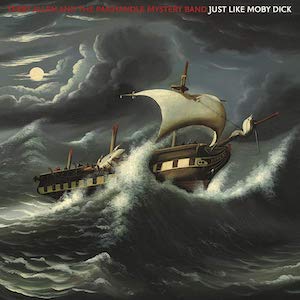 Terry Allen and the Panhandle Mystery Band – Just Like Moby Dick
Terry Allen and the Panhandle Mystery Band – Just Like Moby Dick
Paradise of Bachelors – 24 January 2020
For his first new material in seven years, the acclaimed singer-songwriter and conceptual artist Terry Allen is at the most collaborative of his fifty-year career, the Panhandle Mystery Band featuring the full line-up with son Bukka Allen sharing keyboard duties as well as playing accordion and piano, Charlie Sexton on guitars, longstanding band members pedal steel legend Lloyd Maines and fiddler Richard Bowden and drummer Davis McLarty alongside Glenn Fukunaga on bass and cellist Brian Standefer.
The album takes its title from Herman Melville’s 19th-century metaphorical masterpiece (coincidentally, the label, Paradise of Bachelors, takes its name from a Melville short story), sharing its commentary on memory, obsession and human existence, opening with another legendary American figure in the form of illusionist Harry Houdini experiencing an existential crisis with the Texicali-flavoured Houdini Didn’t Like The Spiritualists.
Featuring Shannon McNally (the first time on an Allen album where’s ceded the vocals), it’s based around how Houdini paradoxically spent much of the 1920s debunking fake mediums (costing him his friendship with Arthur Conan Doyle who fell for their claims) while wanting contact with the afterlife to be true so he could connect with his late mother. As the song notes, he told his wife that, were it possible, he would make contact after his death. After several unsuccessful sequences, in 1943 she declared “ten years is long enough to wait for any man.”
Allen’s other son, Bale, also puts in an appearance providing djembe on the subsequent shufflingly funky lyrically playful, acoustic blues Abandonitis, the title pretty much summing up the theme of being left alone. Then, it’s back to storytelling with the poignant Death of the Last Stripper, a slow waltzing co-write with Jo Harvey Allen and Dave Alvin that prompts John Prine comparisons as he recounts the sad and lonely passing of the sole remaining dancer in the last club in town, of trying to contact her long lost son and her pauper’s funeral.
Given its theme, it’s appropriately followed by the accordion-accompanied lament All That’s Left Is Fare-Thee-Well, a Sexton and Joe Ely co-write barroom waltz duet with McNally duetting and Sexton spotlighted on acoustic singing of “no more second chances”.
The first of two numbers edging past the five-minute mark, another waltz-time tempo, Pirate Jenny isn’t the Brecht-Weill number about the captain of the Black Freighter from The Threepenny Opera, but it is a kind of sequel, Allen speaking the narrative with McNally harmonising on the chorus and Sexton on Spanish guitar, as he tells of her murdering “a captured wench” for her “hot lusty look” and simply disappearing “like the hiss of a soft-kiss” during a battle for booty on the Spanish Main.
Midway through comes the three-part satirical protest of American Childhood, military snare setting the urgent lurching percussive beat of the dobro flavoured Civil Defence with its referencing of the 1960s duck and cover measures to protect yourself in a nuclear strike, the song also referencing WWII comic strip character Sad Sack. Part II, the more restrained and more brooding Bad Kiss, turns its attention to the conflicts in Iran and Afghanistan (“Same fucking war it’s always been”) and, as a high school girl enlists, the cost in young lives, while the subject of the final part (written, like Part I, in 2003 but never previously recorded), the pizzicato rhythm Little Puppet Thing with its Hot Club fiddle is pretty much summed up in the title.
Allen steps back from the mic to accompany McNally on piano as she sings lead on the reflective melancholia of Southern country-soul All These Blues Go Walking By, then a playful mood returns with grandson Kru Allen providing hisses on his carnival carousel coloured tones co-write City of the Vampires which details a vampire-infested circus and the baby vampires sinking their fangs into the clowns’ necks.
The second-longest track, nudging six-minutes, is Harmony Two, a lazy Dixie-style jazz crash and burn romance number penned by Allen’s wife and crooned in sweet as molasses style by McNally, the collection closing with Allen back in Prine soundalike mode with Sailin’ On Through, essentially a carpe diem song where “half the world is screwed/Other half’s insane” so it’s best to just “break out the bottle” and “bring on the glass”, the philosophical last line finally bringing on Melville’s white whale with the album title.
A witty, insightful and musically infectious album with songs that more than stand comparison with his early greats, at 76 Allen proves you’re never too old to lead from the front.
Photo Credit: Barbara FG
